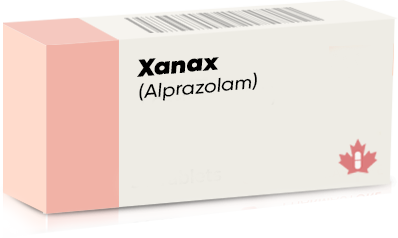Xanax – The Lowdown
Xanax is originally the brand name of a generic medicine alprazolam. It is classified as part of the benzodiazepine drugs class. Along with other associated diseases including generalized anxiety disorder (GAD) and social anxiety disorder, it is frequently given to treat anxiety and panic disorders.
In the realm of anxiolytic medications, Xanax occupies a distinctive niche, offering a quick and effective solution to the pervasive challenges of anxiety. A benzodiazepine renowned for its rapid onset of action, Xanax provides individuals with symptomatic relief from the overwhelming burden of anxiety. While hailed for its efficacy, a comprehensive understanding of the potential pitfalls is imperative. By enhancing GABA’s inhibitory effects, Xanax helps to calm down overactive neural circuits. This is why Xanax is often prescribed to reduce anxiety and panic symptoms. It can feel like turning down the volume of an overexcited brain, leading to a feeling of relaxation and reduced anxiety. When GABA attaches to these receptors, it opens a gate that lets particles called chloride ions into the cell. This makes the brain cells less likely to get excited, which helps with relaxation. Xanax is like a helper for GABA. It makes the GABA receptors even better at calming down brain cells. So, when someone takes Xanax, it’s like giving a little extra power to the “calm down” signal.
Where to Buy Xanax 1mg Online
| Product Name: | Xanax (Alprazolam) |
| Strength: | 10mg |
| Available packages: | 30, 60, 90, 120, 160, 200, 250, 300 pills |
| Payment Method: | E-Check | MASTERCARD |
| Price per pill: | From $3.75 |
| Shipment: | Express Delivery Service |
| Buy Now From: | VISIT PHARMACY |
Intake Guidance for Xanax
- Dosage Adherence: Follow your prescribed dosage meticulously. Xanax comes in various strengths, and your healthcare provider will determine the appropriate amount based on your specific condition.
- Consistency: Take Xanax regularly at the same time each day to maintain a steady level of the medication in your system. Avoid skipping doses to ensure their effectiveness.
- Avoid Alcohol: Refrain from consuming alcohol while on Xanax, as it can intensify the sedative effects and increase the risk of drowsiness and dizziness.
- Communication with Healthcare Provider: Always talk to your doctor openly. Report any unusual side effects or concerns promptly to ensure timely adjustments to your treatment plan.
- Gradual Tapering: If your healthcare provider decides to discontinue Xanax, it’s essential to taper off gradually to prevent withdrawal symptoms. Stopping the medication out of nowhere can lead to unwanted withdrawal effects.
- Monitoring for Side Effects: Be vigilant for potential side effects such as drowsiness, dizziness, and impaired coordination. If experienced, avoid activities requiring mental alertness until you understand how Xanax affects you.
- Avoid Grapefruit: Grapefruit and its juice can interact with Xanax, affecting its absorption. It’s advisable to avoid consuming grapefruit products during Xanax therapy.
Cues For Xanax Use
- Persistent Anxiety or Panic Attacks: It may be a sign that you could benefit from Xanax if you start to have severe, ongoing anxiety or frequent panic attacks that interfere with your everyday activities and general well-being. A doctor should be spoken with about these symptoms so they can assess your condition and decide whether medication is necessary.
- Impaired Social Functioning: It may be a sign that more extensive treatment, like Xanax, is required if anxiety keeps you from engaging in social activities, work, school, or relationships. If anxiety problems are seriously distressing you, then this can be very important.
- Sleep Disturbances: Severe anxiety can lead to sleep disturbances like insomnia or frequent waking during the night. If these issues persist and negatively impact your overall health and functioning, Xanax might be considered as a short-term solution to help regulate sleep patterns.
- Physical Symptoms: Muscle tension, restlessness, shaking, and a racing heartbeat can all be physical signs that your anxiety is getting to the stage where medicine can be helpful.
- Functional Impairment: If your anxiety is hindering your ability to function in various aspects of life—be it personal, professional, or academic—it may be worth discussing with a healthcare provider whether Xanax could provide temporary relief while other therapeutic strategies are explored.
Can I Crush Xanax (Alprazolam)?
Before taking Xanax, the pills shouldn’t be chewed, crushed, or otherwise tampered with. They are designed to be swallowed whole as a tablet. Modifying the tablet’s shape has the potential to interfere with the medication’s planned release mechanism and cause unequal absorption of the drug, which could reduce its effectiveness or have unforeseen side effects. Pay attention to your doctor’s instructions and the directions on the prescription label for the right way to take Xanax. The pill can be taken whole, with water, without being broken or crushed.
Xanax Suitability For Lengthy Periods
Long-term Xanax use can result in the development of tolerance when your body becomes accustomed to the effects of the drug and requires increasing doses to produce the same effects. The rise in dosage raises the possibility of dependence, in which your body becomes relying on the drug to function normally. After long-term use, abruptly discontinuing Xanax can cause withdrawal symptoms such as rebound anxiety, sleeplessness, tremors in the muscles, and in extreme circumstances, seizures. For this reason, medical practitioners typically recommend Xanax for short-term management of acute anxiety or panic symptoms, often a few weeks to a few months.
Benefits Beyond Anxiety Relief
Upon ingestion, Xanax swiftly enters the bloodstream, reaching the brain and binding adeptly to specific receptors, inducing central nervous system depression. This extends its effects to the spinal cord and peripheral nervous system, offering holistic relief in conditions beyond anxiety. Known for alleviating pain through its muscle-relaxant properties, Xanax emerges as a versatile solution. Its rapid onset and prolonged duration make it a popular choice, especially in addressing specific phobias and OCD, where its calming effects stand out. Users appreciate the quick impact and lasting relief, establishing Xanax as a practical option for those seeking efficient and enduring solutions.
Considerations Against Xanax Therapy
Using Xanax for anxiety or panic disorders can have potential drawbacks that individuals should consider. First and foremost, Xanax belongs to a class of drugs known as benzodiazepines, which are habit-forming. Dependency and addiction are significant concerns, as prolonged use can lead to physical and psychological reliance on the medication. Another reason to approach Xanax cautiously is its potential for side effects. Common adverse reactions include drowsiness, dizziness, and impaired coordination. These effects can compromise daily activities, such as driving or operating machinery, and may impact overall cognitive function.
Is Xanax Safe For All?
While it effectively treats anxiety and panic disorders, its use should be cautious. Certain populations, such as pregnant or nursing women, individuals with a history of substance abuse, or those with certain medical conditions, may face increased risks. Xanax can cause drowsiness, dizziness, and cognitive impairment, affecting daily activities. Combining it with alcohol or other medications can be dangerous. Only a healthcare professional can determine if Xanax is safe based on an individual’s medical history, current health status, and potential interactions.
Potential After Effects
Don’t worry much about the side effects, not everyone will experience them. If you have concerns about Xanax or any medication, it’s best to consult with a healthcare professional. Here are some potential side effects:
- Drowsiness: Xanax can cause significant drowsiness, affecting your ability to concentrate and operate machinery.
- Dizziness: Some people have said to experience lightheadedness, especially when standing up quickly.
- Headache: Headaches are a possible side effect, though not everyone will experience them.
- Dry mouth: Xanax may lead to a dry sensation in the mouth.
- Nausea: Some have said to feel a pinch of nausea or have an upset stomach.
- Changes in appetite: Xanax can affect appetite, leading to increased or decreased food intake.
- Slurred speech: Xanax can cause speech-related issues, such as slurring.
- Blurred vision: Vision may become blurry for some individuals taking Xanax.
- Changes in sex drive: Some people may notice changes in their libido while on Xanax.
- Mood swings: Xanax can influence mood, potentially leading to mood swings or changes in emotional state.
- Allergic reactions: Allergic reactions, though uncommon, can occur and may manifest as rash, itching, swelling, severe dizziness, or difficulty breathing.
Customer Testimonials
Logan Nelson – Missouri
After battling anxiety for three decades, it finally overwhelmed me at 37. Zoloft and buspirone came first, then the introduction of Xanax. The initial dose made me realize how much anxiety had dominated my life. I turned to my wife and uttered something profound. It was the first time I truly grasped the extent of anxiety’s control over me.
Aiden Wilson – Ohio
Anxiety had been my constant companion, but it wasn’t until Xanax entered the scene that I felt a profound shift. Now, taking .5 every two days, I find genuine joy in life. It used to be a mere existence, a clouded mind just drifting. Xanax changed that. When I take it, I come alive—happy. I can fully engage with my kids, feeling the overwhelming love I have for them. Life, with Xanax, is not just lived; it’s enjoyed.
Grace Hall – Indiana
Since my teenage years, I’ve grappled with social anxiety and depression, and every antidepressant seemed to worsen things. In my late 30s, a diagnosis of essential head tremors led me to try .25mg of Xanax “if needed.” Surprisingly, it made a significant impact. Not only did it alleviate my head tremors, but it also worked wonders for my social anxiety and even lifted the weight of depression.



